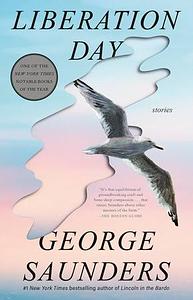Take a photo of a barcode or cover
I read one of these stories—”Elliott Spencer”—in the New Yorker a year or two ago, and on its own, it’s devastating. (Even in the collection, it made me want to cry.) In context, it’s very similarly flavoured to other stories in Liberation Day, including the title one and “Ghoul”. Saunders likes thinking about the intersections of the political and the personal taken to their absurdist and horrifying extremes, which is what he’s doing in these stories, but in a relatively short book a little more variety would have been nice. “Love Letter” is brilliant for dealing with the dystopic vision in a way that feels completely plausible—a grandfather writes to his grandson advising him not to seek answers about the imprisonment of a lover, perfectly encapsulating the apathy, or helplessness, or pragmatism, depending on how you see it, of twenty-first-century liberalism, and projecting that attitude a few decades forward. “Mother’s Day”, which has no speculative elements whatsoever, is one of the best in the collection, in which two elderly women who once loved the same man experience a wordless reckoning in a hailstorm. Even uneven Saunders is better than none.
The title story further explores the themes of Semplica Girl Diaries. Exploitation is a recurring a topif for Saunders. Most of the stories here I'd read in TNY. He goes to great pains to show the redeeming qualities of prit near everyone--which is a compulsion unique to Saunders. My favorite story is A Thing at Work, because it illustrates petty, internecine workplace politics in ways far more relatable than, say, Ghoul.
Saunders continues shining the same light used in his stories all the way back to CivilWarLand in Bad Decline and perfected in Sea Oak. That is to say he is our most trenchant, inventive, compassionate fiction writer. One who breaks our heart, yet still retains a razor sharp edge. It is this collection--even more than his one and only novel--that makes me think for the first time that George Saunders just might, in the not too distant future, be awarded The Nobel Prize in Literature.
Saunders continues shining the same light used in his stories all the way back to CivilWarLand in Bad Decline and perfected in Sea Oak. That is to say he is our most trenchant, inventive, compassionate fiction writer. One who breaks our heart, yet still retains a razor sharp edge. It is this collection--even more than his one and only novel--that makes me think for the first time that George Saunders just might, in the not too distant future, be awarded The Nobel Prize in Literature.
"I just want to say that history, when it arrives, may not look as you expect, based on the reading of history books. Things in there are always so clear. One knows exactly what one would have done."
A 9-story collection with Saunders's characteristic wit splayed empathetically across satirical dystopias. Humor and voice are the stars of these stories as they tackle the human condition in myriad, often oppressive, permutations (backbiting co-workers, resentful mothers, brain-wiped/reprogrammed "workers" owned/operated by other humans, etc.). The potential for love, hope, and redemption underly even the bleakest of these tales and a theme of resilience and artistic/self expression threads its way throughout the volume. Solid, thought-provoking, and quite enjoyable with several standouts ("Liberation Day," "Mom of Bold Action," "A Thing at Work," and "Mother's Day"). Made even more enjoyable thanks to sharing and discussing it with some GR friends.
With his usual humor and surrealism, George Saunders returns to the short-story form with this amazing collection. These nine stories are trademark Saunders--surreal, quirky, and fun--but, most importantly, they comment on larger, more profound societal and political issues with astute precision.
I both read and listened to parts of this book, which was enjoyable, especially since many of the stories are narrated by celebrities, including Jack Brayer ("Ghouls"), Melora Hardin ("Mother's Day"), and Tina Fey ("The Bold Mom of Action.". The title story, "Liberation Day," is read by Saunders himself and is the longest story in the collection. In it, people, who come on hard times, can "apply" to be props in rich people's live performances. The "Speakers" literally have their memories wiped out, are restrained against the wall on a stage, and must perform for a person who has the means to pay their families for the ownership. In this case, a trio are performing Custer's Last Stand for Mr. U. and his rich friends. While the main mind-wiped Speaker considers it an honor to do this work, he doesn't remember his family (who are being paid by Mr. U.); he thinks he's in love with Mrs. U, who is molesting him; and he's upset when Mr. U's son Mike brings in a Resistance group intent on taking this indecency down. While funny and action-packed, the whole idea of this seems far-fetched--until you remember how far people will go to survive in today's world, how some are forced to be degraded or harmed just to survive.
All of the pieces in this thought-provoking collection have the same undercurrent. In "Ghoul," Mike, a performer in a twisted theme park called Maws of Hell, is part of a hierarchical and dangerous livelihood where performers are killed if they say out loud that they realize their park never gets any visitors. In "The Mom of Bold Action," a mom gets irrationally angry and vindictive when her son is pushed down by a mentally unstable man. Each story seems to have people made worse or harmed or controlled by a society that, as a whole, has forgotten how to be humane and decent. It's a society that dehumanizes out of selfishness, arrogance, and/or and societal class structures. Is Saunders commenting on where he sees today's America going?
If you're a Saunders's fan, you love this collection. And, if you've never read Saunders or just read his book, Lincoln in the Bardo, I highly suggest you give this collection a try and absolutely read Tenth of December. Both of these collections are filled with stories that will make you chuckle, amaze you with their surreal brilliance, and absolutely make you think and rethink issues that are prevalence in real-life today. Read this and see a short-story master give us readers brilliance to chew on.
I both read and listened to parts of this book, which was enjoyable, especially since many of the stories are narrated by celebrities, including Jack Brayer ("Ghouls"), Melora Hardin ("Mother's Day"), and Tina Fey ("The Bold Mom of Action.". The title story, "Liberation Day," is read by Saunders himself and is the longest story in the collection. In it, people, who come on hard times, can "apply" to be props in rich people's live performances. The "Speakers" literally have their memories wiped out, are restrained against the wall on a stage, and must perform for a person who has the means to pay their families for the ownership. In this case, a trio are performing Custer's Last Stand for Mr. U. and his rich friends. While the main mind-wiped Speaker considers it an honor to do this work, he doesn't remember his family (who are being paid by Mr. U.); he thinks he's in love with Mrs. U, who is molesting him; and he's upset when Mr. U's son Mike brings in a Resistance group intent on taking this indecency down. While funny and action-packed, the whole idea of this seems far-fetched--until you remember how far people will go to survive in today's world, how some are forced to be degraded or harmed just to survive.
All of the pieces in this thought-provoking collection have the same undercurrent. In "Ghoul," Mike, a performer in a twisted theme park called Maws of Hell, is part of a hierarchical and dangerous livelihood where performers are killed if they say out loud that they realize their park never gets any visitors. In "The Mom of Bold Action," a mom gets irrationally angry and vindictive when her son is pushed down by a mentally unstable man. Each story seems to have people made worse or harmed or controlled by a society that, as a whole, has forgotten how to be humane and decent. It's a society that dehumanizes out of selfishness, arrogance, and/or and societal class structures. Is Saunders commenting on where he sees today's America going?
If you're a Saunders's fan, you love this collection. And, if you've never read Saunders or just read his book, Lincoln in the Bardo, I highly suggest you give this collection a try and absolutely read Tenth of December. Both of these collections are filled with stories that will make you chuckle, amaze you with their surreal brilliance, and absolutely make you think and rethink issues that are prevalence in real-life today. Read this and see a short-story master give us readers brilliance to chew on.
Another collection of short stories from Saunders is a good thing. The stories here are unmistakably Saunders, preoccupied with the lessers of the world and the biggers of their worries. With more formal experimentation (vibes of Bardo...), these stories range from traditional to more experimental forms and perspectives. It is always fun to read Saunders playing with these things. Several stories hinge on shifting POVs doing a Rashomon style narrative.
All said, tho, I'm not sure this is Saunders at his best. (To be fair, "not at his best" for Saunders is still quite good, in general.) These are all very good stories, but they have close analogs in previous Saunders collections. "Ghoul" and "Liberation Day" have echoes of "Civilwarland in Bad Decline"; "A Thing at Work" feels like several previous workplace stories from previous collections. Standouts are certainly "A Mom of Bold Action" and "Mother's Day", both of which illustrate a pathos and perspective that is touching and effective.
Nonetheless, this is a solid collection of good stories. Saunders continues to be a master of prose and guru of dialogue. His language is minimal and profound. And he continues to excel at the short form, giving each story enough meat to satisfy, without overworking the unique qualities that make his work enjoyable.
All said, tho, I'm not sure this is Saunders at his best. (To be fair, "not at his best" for Saunders is still quite good, in general.) These are all very good stories, but they have close analogs in previous Saunders collections. "Ghoul" and "Liberation Day" have echoes of "Civilwarland in Bad Decline"; "A Thing at Work" feels like several previous workplace stories from previous collections. Standouts are certainly "A Mom of Bold Action" and "Mother's Day", both of which illustrate a pathos and perspective that is touching and effective.
Nonetheless, this is a solid collection of good stories. Saunders continues to be a master of prose and guru of dialogue. His language is minimal and profound. And he continues to excel at the short form, giving each story enough meat to satisfy, without overworking the unique qualities that make his work enjoyable.
3.5. Some stories drew me more than most. That says, all were quite unique and most took me a bit to figure out what was happening.
Does Saunders rely on his bag of tricks here? Yes. In a sense, it's same-old same-old. But Saunders' "same-old" is so disorienting, so poignant, so full of wisdom and sly mirth and food for thought, I was nothing but grateful that this book gave me more of what I loved in Tenth of December. When several of the stories began, I was convinced *this* would be the one I wouldn't warm to. But I was pulled in every time.
(Though I'm surprised several reviewers here have singled out "Love letter" as one of their favorites--that was one of the few that--with its lack of details and less attention to character--felt more like a writing exercise than a story. But I still enjoyed it for what it was.)
(Though I'm surprised several reviewers here have singled out "Love letter" as one of their favorites--that was one of the few that--with its lack of details and less attention to character--felt more like a writing exercise than a story. But I still enjoyed it for what it was.)
Some of these stories are really intense, but I really like his weird take on the future.
Such imaginative writing. He is an expert at examining the way human beings treat each other. Great thoughtful stuff.





